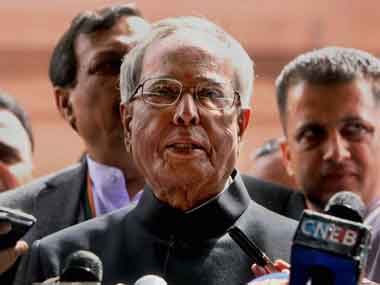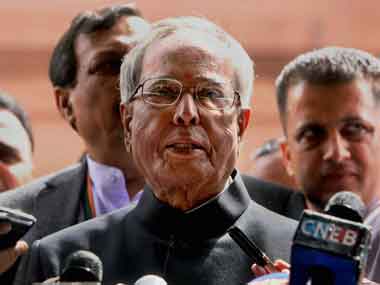By any serious standard of ethical or moral conduct, Finance Minister Pranab Mukherjee’s Budget 2012-13 can be faulted on at least two counts.
First, he was in ethical breach of market regulator Sebi’s insider trading regulations, which require corporate insiders to refrain from market purchases or sales when they are in possession of undisclosed price-sensitive information. The finance minister probably knew that the budget would impose a cess on domestically produced crude - but still went ahead with the ONGC disinvestment earlier this month.
Second, he has proposed changes in tax law that will essentially overturn a Supreme Court judgment in the Vodafone tax case by making the amendments retrospective all the way to 1962. This is nothing but an effort to change the rules of the game after losing the match fair and square.
[caption id=“attachment_247833” align=“alignleft” width=“380” caption=“By trying to backdate the law, the government is not only trying to claw back the money it lost in the case, but is trying to say that it can change the rules at its sweet will. PTI”]
 [/caption]
[/caption]
Let’s take the first one first.
In the budget, Pranab Mukherjee imposed an additional cess of Rs 2,000 tonne - raising it from Rs 2,500 to Rs 4,500 a tonne - on domestically produced crude oil under the provisions of the Oil Industry Development Act, 1974.
The government is certainly within its rights to hike the cess. However, it came barely two weeks after it sold nearly 5 percent of ONGC’s shares through an offer for sale on the stock exchange after Sebi specifically created a window to enable such a sale. There were very few investors keen on ONGC at that point. If investors had known about the forthcoming cess, the share sale would have flopped even more miserably. In any event, the finance ministry ultimately got Life Insurance Corporation (LIC) to bail out the issue.
Impact Shorts
More ShortsIn the share sale, not only did LIC have to buy ONGC shares at a premium to market prices, but it was also found to have been buying ONGC in the weeks before the sale date - almost like what a crooked promoter would do to rig prices. Only LIC knows if this was done purely in policyholders’ interests or at the bidding of higher-ups in the finance ministry.
But the budget cess takes the cake.
The finance ministry - which was the party most interested in the ONGC stake sale - surely knew this cess hike was coming. Unless it claims the idea came up after the stake sale, this would amount to withholding crucial price sensitive information from investors ahead of a share sale.
The only ethically right course of action for the finance minister to take - assuming it wanted to set high standards of corporate governance, which, of course, has manifestly not been the case - would have been to defer the ONGC stake sale till after the budget.
There is also another issue: would LIC have bought up so many of ONGC shares if it knew the cess was coming? ONGC, Oil India and Gail - the three public sector production and exploration companies - already bear a huge share of the fuel subsidy burden that rightfully belongs to the budget. Now, there is also the cess to reckon with. The FM has added insult to injury.
The Indian Express notes that LIC has been made to bleed after “rigging.”
In the Vodafone case, the Supreme Court ruled in January that the company did not have to deduct tax at source (TDS) on its purchase of Hutchison Essar shares in an offshore deal. The court held that since the tax provisions were not applicable to a deal that done offshore, Vodafone did not have to deduct tax on the capital gains made by Hutchison.
However, the budget not only clarifies that capital gains will have to be paid on share transfers done offshore where the underlying asset in an Indian one, but that this applies retrospectively all the way to 1962.
The explanatory memorandum accompanying the budget says: “For the removal of doubts, it is hereby clarified that an asset or a capital asset being any share or interest in a company or entity registered or incorporated outside India shall be deemed to be and shall always be deemed to have been situated in India.”
As a clarification for the future, this is fine. But retrospectively?
The Supreme Court judgment on Vodafone was hailed because it set the principle that if the government wants to tax something, the law should explicitly provide for it so that foreign investors knew what they had to do.
By trying to backdate the law, the government is not only trying to claw back the money it lost in the case, but is trying to say that it can change the rules at its sweet will.
Fereshte Sethna, lawyer in the Vodafone case, has blasted the government’s move as “unconstitutional.” She said: “While prospective legislation was a clear route available to the government of India,” it has chosen instead to “pursue enacting of retrospective legislation” that is “harsh, oppressive, excessive, arbitrary and (with) penal consequences, hence rendering it liable to be declared unconstitutional. An era of unwarranted tax uncertainty has potentially been ushered in vis-a-vis foreign investors into India…”.
Firstpost agrees that this is ethically untenable, and will achieve the exact opposite of what the Supreme Court intended - of providing foreign investors a clear set of rules. The rules are being put in place after the event, and the Financial Times notes that it will “further dismay international investors already downhearted by the country’s unpredictable regulation.”
Surely, for a country which needs more investment, the finance minister could have avoided displaying this kind of ethical deficit?
The Vodafone case will surely end up in court. For a government that has been repeatedly singed in recent court verdicts, this is clearly an unnecessary distraction.
)